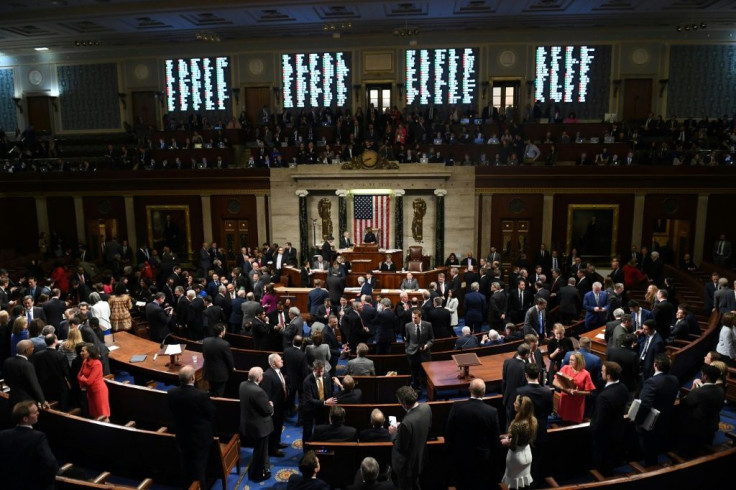Thursday's Stock Market Open: US Equities Open Higher Despite Trump Impeachment

KEY POINTS
- Trump is expected to be acquitted by GOP-controlled Senate
- Swedish central bank exits negative interest rates
- Bank of England kept rates unchanged
U.S. stocks traded higher at noon Thursday, as investors shrugged off Wednesday's vote by the House of Representatives voted to impeach President Donald Trump, as well as some mixed economic data.
The Dow Jones Industrial Average gained 105.38 points to 28,344.66 while the S&P 500 climbed 9.82 points to 3,200.96 and the Nasdaq Composite Index rose 43.25 points to 8,870.98.
Trump is expected to be acquitted by the Senate, which is controlled by Republicans.
“While [impeachment] is garnering significant press attention, it remains of little concern to equity markets given that Trump’s acquittal in the Senate is a near certainty,” said Robert Kerning, a J.P. Morgan trader in a note on Wednesday.
Joe Watkins, former White House aide for President George H.W. Bush told CNBC: “If Democrats meant to diminish the strength of the president, I think the opposite is going to happen.”
On the trade front, Treasury Secretary Steven Mnuchin told CNBC he is “very confident” that the U.S. and Chinese will sign their “phase one” trade deal in early January. “It’s just going through what I would consider to be a technical, legal scrub and we’ll be releasing the document and signing it in the beginning of January,” he said.
Initial jobless claims decreased by 18,000 to a seasonally adjusted 234,000 for the week ended Dec. 14, the Labor Department said. Economists had expected claims to fall to 225,000.
The National Association of Realtors said sales of existing homes slipped 1.7% in November to a seasonally adjusted annual rate of 5.35 million.
The U.S. Energy Information Administration said Thursday that domestic natural gas supplies dropped by 107 billion cubic feet for the week ended Dec. 13. Analysts expected a fall of 93 billion cubic feet.
The Conference Board’s Leading Economic Index stood flat at 111.6 in November, following a 0.2% decline in October.
"The [Leading Economic Index] was unchanged in November after three consecutive monthly declines," Ataman Ozyildirim, senior director of economic research at the Conference Board, said. "Strength in residential construction, financial markets, and consumers' outlook offset weakness in manufacturing and labor markets."
The Philadelphia Fed said Thursday its index of business activity in the region plunged in December to 0.3 -- the lowest level in six months -- from 10.4 in the previous month. Economists had expected an 8 reading.
The U.S. current-account deficit declined 0.9% in the third quarter to $124.1 billion from a revised figure of $125.2 billion in the second quarter.
The Bank of England kept its main interest rate unchanged at 0.75% by a vote of 7-2.
“If global growth fails to stabilize or Brexit uncertainties remain entrenched, monetary policy may need to reinforce the expected U.K. recovery,” the bank stated.
Bank of England also said an audio feed of its press conferences was leaked to hedge funds just prior to broadcast, meaning some traders could hear Governor Mark Carney’s words a few seconds early.
The Bank of Japan voted to keep short-term interest rates unchanged at -0.1% and long-term rates at 0%. “Japan’s economy is likely to continue on a moderate expanding trend, as the impact of the slowdown in overseas economies on domestic demand is expected to be limited, although the economy is likely to continue to be affected by the slowdown for the time being,” the central bank stated.
Sweden's central bank, the Riksbank, raised its key interest rate to zero from negative-0.25%, but added it does not plan to raise the key rate further next year. Sweden has had subzero rates since 2009.
People’s Bank of China injected the most liquidity since January to guarantee sufficient cash supply for the end of the year.
South Korea’s Ministry of Economy and Finance said Thursday that it expects the country's gross domestic product to grow 2.4% in 2020, lower than the July projection of 2.6%, but stronger than this year's anticipated 2% growth.
On Thursday, China’s Finance Ministry released a new list of import tariff exemptions for six chemical and oil products from the U.S. The exemptions will last for one year from Dec. 26.
“The exemptions could see China resume buying more [metallocene high-density polyethylene] and [linear low-density polyethylene] from the U.S., reversing the trade flow, as the U.S. supplies have been diverted to Latin America and Europe while China has been importing mostly from the Middle East,” said Kelly Cui, principal analyst with consultancy Wood Mackenzie.
U.K. retail sales fell by 0.6% in November, the fourth straight month of declines, the Office for National Statistics said Thursday. "All main sectors saw their sales fall with the exception of food stores," statistician Rhian Murphy said.
Overnight in Asia, markets finished mostly lower. The Hang Seng slipped 0.3% while Japan’s Nikkei-225 fell 0.29% and China’s Shanghai Composite was flat.
European markets finished mixed with the FTSE 100 up 0.44% while Germany's DAX fell 0.08% and France's CAC 40 dropped 0.21%.
Crude oil futures rose 0.61% at $61.30 per barrel and Brent crude gained 0.68% at $66.62. Gold futures climbed 0.24%.
The euro rose 0.14% at $1.1130 while the pound sterling dropped 0.35% at $1.3033.
© Copyright IBTimes 2025. All rights reserved.





















